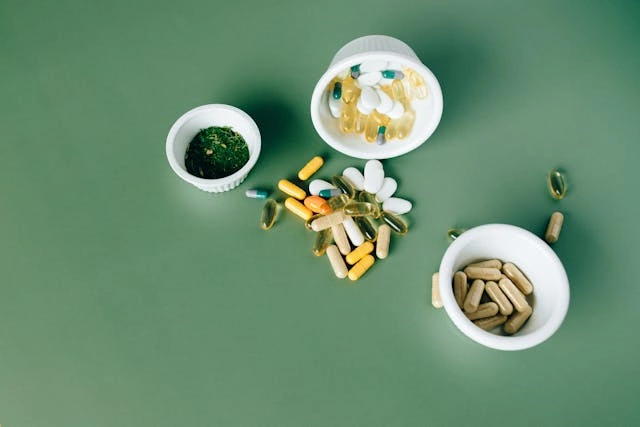For decades, psychiatry has focused almost exclusively on what happens above the neck. Depression? A chemical imbalance in the brain. Anxiety? Overactive neural circuits. But a revolution is quietly unfolding in our understanding of mental health, and it’s centered on an unexpected place: the human gut.
Scientists are discovering that the trillions of bacteria living in your intestines may be as important to your mental health as the neurons in your brain. This isn’t alternative medicine or wellness trend speculation. It’s cutting-edge neuroscience that’s forcing us to reconsider everything we thought we knew about conditions like depression, anxiety, and even autism.
The second brain in your belly
Your gut contains approximately 500 million neurons—more than in your spinal cord. This network, called the enteric nervous system, operates with remarkable independence from your brain, controlling digestion, immune responses, and producing a stunning array of neurotransmitters. In fact, about 90% of your body’s serotonin, the neurotransmitter most associated with mood and wellbeing, is produced not in your brain but in your gut.
But the real story isn’t just about these neurons. It’s about the gut microbiome—the vast ecosystem of bacteria, viruses, fungi, and other microorganisms living in your digestive tract. A typical human carries between 2 and 5 pounds of these microbes, comprising roughly 39 trillion individual organisms. That’s more microbial cells than human cells in your body.
These microbes aren’t passive passengers. They’re constantly communicating with your brain through multiple channels: the vagus nerve, which runs directly from your gut to your brain stem; immune system messengers; and by producing neurotransmitters and other molecules that enter your bloodstream and cross into your brain.
Depression begins in the gut?
One of the most striking discoveries in recent years involves the link between gut bacteria and depression. Researchers have found that people with major depressive disorder have distinctly different gut microbiome compositions compared to healthy individuals. Specific bacterial species appear consistently depleted in depressed patients across multiple studies.

But correlation isn’t causation, which is why scientists turned to a more definitive experiment. In a landmark 2019 study, researchers collected fecal samples from patients with depression and transplanted them into rats that had been raised in sterile conditions without any gut bacteria of their own.
The results were startling: the rats began exhibiting behaviors characteristic of depression and anxiety—reduced pleasure-seeking, less social interaction, and disrupted sleep patterns. Rats receiving microbiome transplants from healthy humans showed no such changes.
This wasn’t just behavioral. The depressed-microbiome rats showed measurable changes in brain chemistry and metabolism, particularly in regions associated with mood regulation. The implication is profound: depression may, in at least some cases, have its roots in the gut rather than being purely a brain disorder.
The inflammatory connection
One of the key mechanisms linking gut health to mental health is inflammation. When your gut microbiome is out of balance—a condition called dysbiosis—the intestinal barrier can become compromised, allowing bacterial fragments and other molecules to leak into the bloodstream. This triggers widespread inflammation throughout the body, including in the brain.
Chronic low-grade inflammation has emerged as a major factor in depression. About one-third of people with depression have elevated inflammatory markers in their blood, and those with treatment-resistant depression show even higher levels. Inflammation affects the brain in multiple ways: it reduces the production of neurotransmitters like serotonin and dopamine, damages neurons, and disrupts the connections between different brain regions.
Your gut bacteria play a crucial role in either promoting or suppressing inflammation. Beneficial bacteria produce short-chain fatty acids like butyrate when they digest fiber. These molecules have powerful anti-inflammatory effects and help maintain the integrity of the gut barrier. Other bacteria can produce compounds that directly stimulate inflammation.
Anxiety and the microbiome
The gut-brain connection appears equally important for anxiety disorders. People with anxiety conditions often report gut symptoms—the butterflies before a presentation, nausea during stress, or the urgent need for a bathroom during panic. This isn’t coincidental. Anxiety and gut function are deeply intertwined.
Studies have shown that people with irritable bowel syndrome have significantly higher rates of anxiety and depression—up to 50-90% experience psychiatric symptoms. The question is whether gut problems cause anxiety, anxiety causes gut problems, or both stem from shared underlying mechanisms.
Animal research suggests gut bacteria may be a causal factor. Mice bred to be anxious become calmer when given beneficial bacteria like Lactobacillus and Bifidobacterium strains. Conversely, stress alters the gut microbiome in ways that can perpetuate anxiety. This creates a potential vicious cycle: stress disrupts your gut bacteria, which increases inflammation and affects neurotransmitter production, leading to more anxiety, which further damages gut health.
The Autism Spectrum connection
Perhaps nowhere is the gut-brain connection more evident than in autism spectrum disorder. Between 40-90% of children with autism experience gastrointestinal problems—far higher than in the general population. These aren’t minor issues: many experience severe constipation, diarrhea, bloating, and pain.

Research has revealed that autistic children have markedly different gut microbiomes compared to neurotypical children, with reduced bacterial diversity and different ratios of key bacterial species. Some studies have found that the severity of autism symptoms correlates with the severity of gut problems, though this relationship isn’t universal.
In a small but provocative 2017 study, researchers gave children with autism a form of microbiome transplant therapy. The treatment involved antibiotics followed by daily doses of beneficial bacteria from healthy donors. The results were striking: gastrointestinal symptoms improved by 80%, and autism-related behavioral symptoms improved significantly. Even more remarkably, when researchers followed up two years later, the improvements had not only persisted but continued to grow.
This doesn’t mean autism is a gut disease or that it can be cured with probiotics. The relationship is far more complex. But it does suggest that gut health may be a modifiable factor that influences symptom severity and quality of life for people on the spectrum.
What about ADHD and schizophrenia?
The gut-brain research is expanding into other psychiatric conditions. Children with ADHD show different gut microbiome patterns compared to neurotypical children, with some studies finding that specific bacterial compositions correlate with attention and hyperactivity levels. Small pilot studies using probiotic supplements have shown modest improvements in ADHD symptoms, though much more research is needed.
Schizophrenia research has revealed intriguing connections as well. People with schizophrenia have altered gut microbiomes, and some of the microbial changes appear to affect brain regions and neurotransmitter systems implicated in the disorder. One study found that treating mice with schizophrenia-associated microbiomes with specific probiotic bacteria reduced behaviors similar to schizophrenia symptoms.
The diet-mood connection
If gut bacteria influence mental health, then what you eat—which directly shapes your microbiome—becomes a psychiatric intervention. This is the premise behind nutritional psychiatry, an emerging field examining how diet affects mental health.
The evidence is growing. The SMILES trial, published in 2017, was the first randomized controlled trial to test whether dietary changes could treat depression. Participants with moderate to severe depression were assigned either to dietary counseling focused on a Mediterranean-style diet or to social support sessions. After 12 weeks, 32% of those in the dietary group achieved remission from depression compared to only 8% in the control group—a remarkable difference.
The Mediterranean diet emphasized whole grains, vegetables, fruits, legumes, nuts, olive oil, and fish while limiting processed foods, sugar, and red meat. This type of diet promotes beneficial gut bacteria and reduces inflammation. Other studies have found similar results, with healthier dietary patterns consistently associated with lower rates of depression and anxiety.
Specific foods show particular promise. Fermented foods like yogurt, kefir, kimchi, and sauerkraut contain live beneficial bacteria. Prebiotic foods—those high in fiber that feed good bacteria—include onions, garlic, bananas, oats, and legumes. Omega-3 fatty acids from fish have anti-inflammatory effects. Polyphenols from berries, tea, and dark chocolate promote beneficial bacterial growth.
The probiotic promise and problem
Given these connections, it’s no surprise that probiotic supplements have exploded in popularity. The global probiotics market is worth tens of billions of dollars, with products marketed for everything from mood to immunity. But do they actually work for mental health?

The research is mixed. Some well-designed studies have found that specific probiotic strains can reduce symptoms of depression and anxiety, with effects comparable to conventional medications in some cases. A 2020 meta-analysis examining 10 clinical trials found that probiotics produced small but significant improvements in depression symptoms.
However, many probiotic studies show no effect, and the field is plagued by inconsistency. The term “probiotic” is broad—different bacterial strains have completely different effects, and most commercial products don’t contain the specific strains studied in research. Dosing, timing, and individual variation in existing gut bacteria all matter enormously.
The concept of “psychobiotics”—probiotics specifically intended to improve mental health—is being refined. Researchers are working to identify which specific bacterial strains, in what doses, and for which conditions might actually be therapeutic. Some promising candidates include Lactobacillus rhamnosus, Bifidobacterium longum, and Lactobacillus helveticus, but we’re still in the early stages of understanding.
The vagus nerve highway
One of the key communication routes between gut and brain deserves special attention: the vagus nerve. This long, wandering nerve (vagus means “wandering” in Latin) extends from your brain stem down through your neck and chest into your abdomen, connecting to most of your major organs including your gut.
The vagus nerve is a two-way street, but surprisingly, about 80-90% of its fibers carry information from the body to the brain rather than the reverse. Your gut bacteria can directly influence signals traveling along the vagus nerve, affecting brain regions involved in mood, fear, and memory.
In animal studies, cutting the vagus nerve eliminates many of the behavioral effects of probiotic bacteria, confirming this nerve’s critical role. Conversely, vagus nerve stimulation—an FDA-approved treatment for treatment-resistant depression—may work partly through its effects on gut function and inflammation.
This has led to interest in non-invasive ways to stimulate the vagus nerve, from deep breathing exercises to cold exposure to meditation. While the science is still developing, the idea that we might improve mental health by strengthening gut-brain communication through vagal tone is intriguing.
The stress-gut vicious cycle
Stress profoundly affects your gut microbiome, and your gut microbiome influences how you respond to stress. This bidirectional relationship creates feedback loops that can either promote resilience or perpetuate mental health problems.
When you experience stress, your body releases cortisol and activates the sympathetic nervous system. This changes gut motility, increases intestinal permeability, and alters the environment in ways that favor certain bacteria over others. Within hours of acute stress, the composition of your gut microbiome begins to shift. Chronic stress produces more dramatic changes, often reducing beneficial bacteria and microbial diversity.
These stress-induced changes then feedback to the brain. Animals raised without any gut bacteria show exaggerated stress responses—their stress hormones spike higher and take longer to return to baseline after stressful events. When given beneficial bacteria, their stress responses normalize. The microbiome, it seems, is essential for proper stress regulation.
In humans, people with more diverse gut microbiomes tend to show better stress resilience. The mechanisms involve inflammation, neurotransmitter production, and direct neural signaling. Beneficial bacteria help maintain the integrity of the blood-brain barrier, produce compounds that reduce anxiety-like behaviors, and may even influence the development of brain regions involved in emotional regulation.
Early life: a critical window
The gut-brain connection begins before birth and is especially important in early life. Babies are born with sterile guts and acquire their microbiomes during birth and in the first few years of life. Mode of delivery matters: babies born vaginally acquire different bacteria than those born by cesarean section, with C-section babies showing microbiome differences that can persist for years.
Breastfeeding shapes the infant microbiome in important ways, providing not just nutrients but complex sugars specifically designed to feed beneficial bacteria. Antibiotic exposure in early childhood—which has increased dramatically in recent decades—can significantly alter the developing microbiome.
These early-life microbiome differences may have lasting mental health implications. Some research suggests that C-section delivery and early antibiotic exposure are associated with slightly increased risks of ADHD, autism, and anxiety later in childhood, though these relationships are complex and influenced by many factors.
The developing microbiome communicates with the developing brain during critical periods when neural circuits are being established. Animal studies show that the gut microbiome influences brain development, affecting everything from the growth of brain cells to the formation of the blood-brain barrier to the maturation of the immune system.
What this means for treatment
The gut-brain connection is opening new avenues for treating mental illness. Some psychiatrists are already incorporating gut health assessments and interventions into their practice, though this remains far from standard care.
Current and emerging approaches include dietary counseling as a complement to traditional treatments, with emphasis on anti-inflammatory eating patterns; specific probiotic formulations targeted to particular conditions, though more research is needed; prebiotics—fiber supplements that feed beneficial bacteria; fecal microbiota transplantation, already used successfully for certain gut infections and being studied for psychiatric conditions; and medications that target both gut and brain, recognizing their interconnection.
However, we’re not yet at the point where your psychiatrist can test your gut bacteria and prescribe specific interventions. The science is advancing rapidly, but we still don’t know enough about which specific bacterial profiles are optimal, how to reliably change the microbiome in lasting ways, or which patients will respond to gut-focused interventions.
What you can do
While research continues, some evidence-based approaches to supporting gut-brain health include eating a diverse, fiber-rich diet with plenty of vegetables, fruits, whole grains, and legumes; including fermented foods like yogurt, kefir, or kimchi regularly; limiting ultra-processed foods, excess sugar, and artificial sweeteners that may harm gut bacteria; managing stress through proven techniques like exercise, meditation, or therapy; using antibiotics judiciously and only when necessary; getting adequate sleep, which influences gut bacteria composition; and considering probiotic supplements, ideally with guidance from a healthcare provider familiar with the research.
The story of the gut-brain connection is still being written. Every month brings new discoveries about how our microbiomes influence our minds and how interventions targeting the gut might alleviate mental suffering. We’re witnessing the emergence of a more integrated understanding of mental health—one that recognizes the brain not as an isolated command center but as one part of a complex, interconnected system involving every aspect of our biology.
For the millions of people struggling with depression, anxiety, and other mental health conditions, this research offers something invaluable: hope. Hope that there are new avenues to explore, new interventions to try, and new understanding about why conventional treatments sometimes fall short. The answers to our mental health challenges may not lie solely in our heads, but in the complex ecosystem thriving in our guts.
Sources
- Cheung, S.G., Goldenthal, A.R., Uhlemann, A.C., Mann, J.J., Miller, J.M. and Sublette, M.E. (2019) ‘Systematic review of gut microbiota and major depression’, Frontiers in Psychiatry, 10, p. 34.
- Li, N. et al. (2019) ‘Fecal microbiota transplantation from chronic unpredictable mild stress mice donors affects anxiety-like and depression-like behavior in recipient mice via the gut microbiota-inflammation-brain axis’, Stress, 22(5), pp. 592-602.
- Tillmann, S. et al. (2021) ‘Faecal microbiota transplantation from patients with depression or healthy individuals into rats modulates mood-related behaviour’, Scientific Reports, 11, 20638.
- Zhang, Y. et al. (2022) ‘Effects of ‘healthy’ fecal microbiota transplantation against the deterioration of depression in fawn-hooded rats’, mSystems, 7(3), e00218-22.
- Kang, D.W. et al. (2019) ‘Long-term benefit of microbiota transfer therapy on autism symptoms and gut microbiota’, Scientific Reports, 9, 5821.
- Li, N. et al. (2021) ‘Fecal microbiota transplantation relieves gastrointestinal and autism symptoms by improving the gut microbiota in an open-label study’, Frontiers in Cellular and Infection Microbiology, 11, 759435.
- Jacka, F.N. et al. (2017) ‘A randomised controlled trial of dietary improvement for adults with major depression (the ‘SMILES’ trial)’, BMC Medicine, 15(1), 23.
- Opie, R.S. et al. (2017) ‘A modified Mediterranean dietary intervention for adults with major depression: Dietary protocol and feasibility data from the SMILES trial’, Nutritional Neuroscience, 21(7), pp. 487-501.
- El Dib, R. et al. (2021) ‘Probiotics for the treatment of depression and anxiety: A systematic review and meta-analysis of randomized controlled trials’, Clinical Nutrition ESPEN, 45, pp. 75-90.
- Liu, R.T., Walsh, R.F.L. and Sheehan, A.E. (2019) ‘Prebiotics and probiotics for depression and anxiety: A systematic review and meta-analysis of controlled clinical trials’, Neuroscience & Biobehavioral Reviews, 102, pp. 13-23.
- Zhang, Q. et al. (2023) ‘Effect of prebiotics, probiotics, synbiotics on depression: results from a meta-analysis’, BMC Psychiatry, 23(1), 477.
- Cryan, J.F. et al. (2023) ‘The microbiota-gut-brain axis in stress and depression’, Frontiers in Neuroscience, 17, 1151478.
- McGuinness, A.J. et al. (2022) ‘A systematic review of gut microbiota composition in observational studies of major depressive disorder, bipolar disorder and schizophrenia’, Molecular Psychiatry, 27, pp. 1920-1935.
- Srikantha, P. and Mohajeri, M.H. (2019) ‘The possible role of the microbiota-gut-brain-axis in autism spectrum disorder’, International Journal of Molecular Sciences, 20(9), 2115.
